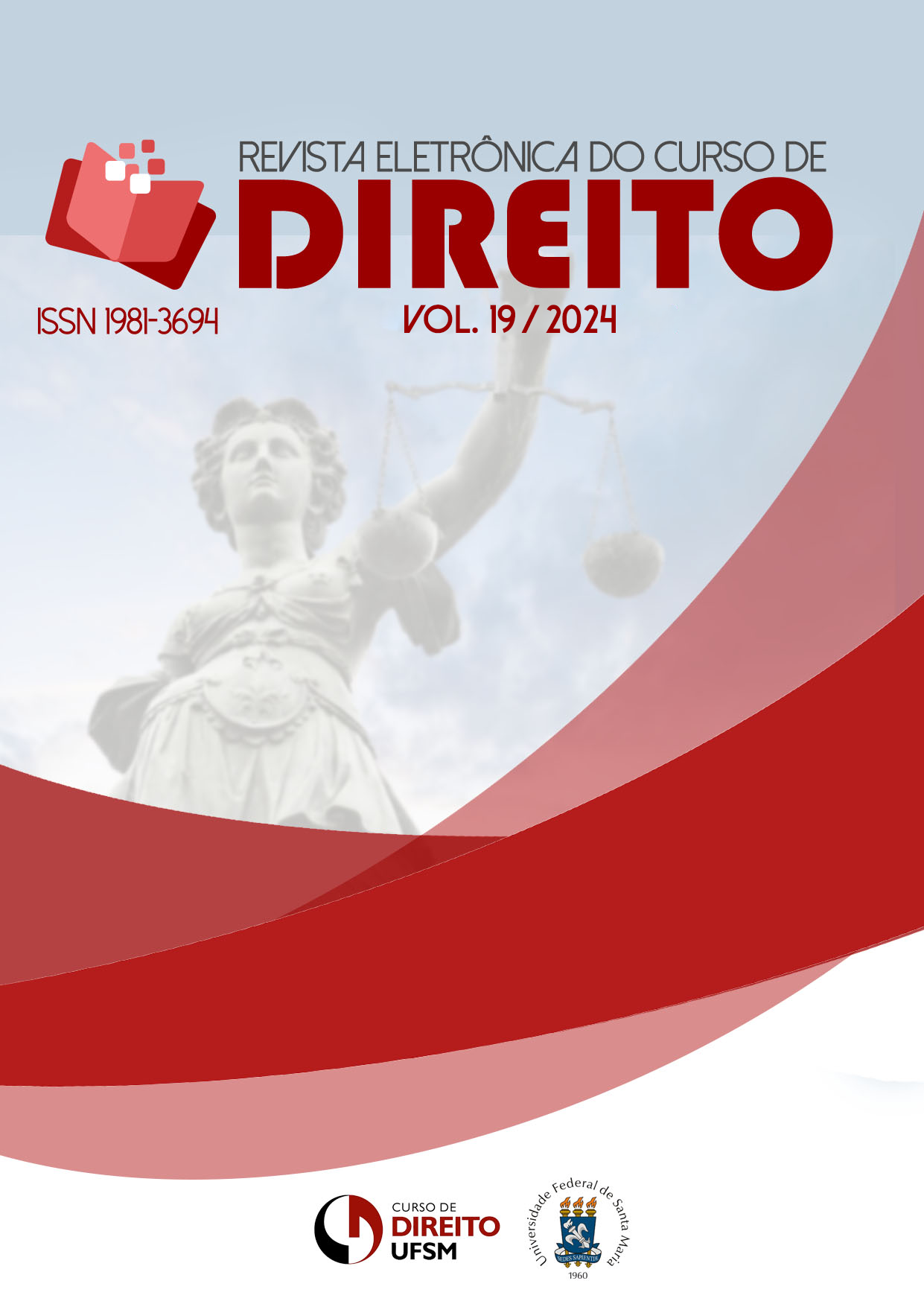The interlocution between the communicative action theory and the decision-making: the influence of nudges in criminal law
DOI:
https://doi.org/10.5902/1981369471812Keywords:
Society, Argumentation, Nudges, JusticeAbstract
Nowadays, the Law needs new clothes with regard to its interpretation and argumentation and in this vein, the philosophy of language played an important role in legal hermeneutics. Habermas developed the Theory of Communicative Action, putting communication in focus, through participatory democracy. Given this circumstance, the architecture of choices has been gaining ground in various branches of law, but still little covered by Criminal and Criminal Procedural Law. Thus, this study has the general objective of applying the concept of nudges, coming from Behavioral Economics to Criminal Law and Criminal Procedure. As specific objectives there is the analysis of the Theory of Communicative Action; an explanation of nudges and how the concept was formulated. Finally, its applicability in themes will be demonstrated, as well as an analysis of leading cases. Therefore, the methodology to be used is the deductive method and bibliographic research. In the end, the influence of nudges on legal discourse will be verified, both in terms of legislation and applicability through convincing the party that will decide the dispute.
Downloads
References
ALMEIDA, Catharina; NUNES, Dierle. Medidas indutivas em sentido amplo do art. 139, IV, do CPC: o potencial do uso de nudges nos módulos processuais executivos para satisfação de obrigações por quantia certa–parte 2. Revista de Processo| vol, v. 323, n. 2022, p. 149-176, 2022. Disponível em: https://d1wqtxts1xzle7.cloudfront.net/ Acesso em: 08 jul. 2022
ALVES, Marco Antônio Sousa. Racionalidade e argumentação em Habermas. Kínesis-Revista de Estudos dos Pós-Graduandos em Filosofia, v. 1, n. 02, p. 179-195, 2009. Disponível em: https://revistas.marilia.unesp.br/index.php/kinesis/article/view/4317 Acesso em 04 jul. 2022 DOI: https://doi.org/10.36311/1984-8900.2009.v1n02.4317
ARAUJO, Luiz Bernardo Leite. Religião e Modernidade em Habermas. São Paulo: Edições Loyola, 1996, 212 p.
ARAUJO, Luiz Bernardo Leite. Pluralismo e Justiça: Estudos sobre Habermas. São Paulo: Edições Loyola, 2010, 200 p.
ARAUJO, Luiz Bernardo Leite. Anotações sobre secularismo e pós-secularismo em Habermas. Síntese –Revista de Filosofia, v. 50, p. 101-117, 2023. DOI: https://doi.org/10.20911/21769389v50n156p101/2023
ARAUJO, Luiz Bernardo Leite. Habermas e Rawls no cenário da filosofia moral e política contemporânea. Revista Sofia, v. 6, n. 1, p. 4-16, 2017. DOI: https://doi.org/10.47456/sofia.v6i1.16161
ASSAÍ, José Henrique Sousa. Esfera pública e democracia em Habermas: o orçamento participativo enquanto práxis normativa. Diálogos Críticos-ISSN 2238-3468, v. 2, n. 1, 2012. Disponível em: https://dialogoscriticos.com/revista/index.php/dialogoscriticos/article/view/6 Acesso em 04 jul. 2022
AZEVEDO, Bernardo Montalvão Varjão de. Ensaio sobre uma teoria geral dos atos de comunicação no processo penal brasileiro: à luz da teoria da ação comunicativa habermasiana. Direito Público, v. 6, n. 25, 2009. DOI: https://doi.org/10.11117/22361766.25.01.09
BACHUR, João Paulo; GONÇALVES, Guilherme Leite. O direito na sociologia de Niklas Luhmann in RODRIGUES, José Rodrigo; SILVA, Felipe Gonçalves. Manual de Sociologia Jurídica. São Paulo: Saraiva, 2013. Disponível em: https://www.portaldeperiodicos.idp.edu.br/direitopublico/article/view/1443 Acesso em: 04 jul. 2022.
BAHIA, Alexandre Gustavo Melo Franco; SIMIONI, Rafael Lazzarotto. Como os juízes decidem? Proximidades e divergências entre as teorias da decisão de Jürgen Habermas e Niklas Luhmann. Seqüência: estudos jurídicos e políticos, v. 30, n. 59, p. 61-88, 2009. Disponível em: https://dialnet.unirioja.es/servlet/articulo?codigo=4818171 Acesso em: 05 jul. 2022 DOI: https://doi.org/10.5007/2177-7055.2009v30n59p61
BARBOSA, Jessica Rabelo; ATHIAS, Arianne Brito Cal. Política pública emergencial e o novo mecanismo transdisciplinar. Revista de Direito Sociais e Políticas Públicas, v. 6, n. 2, p. 58-75, 2020. Disponível em: https://indexlaw.org/index.php/revistadspp/article/view/7143 Acesso em: 05 jul. 2022. DOI: https://doi.org/10.26668/IndexLawJournals/2525-9881/2020.v6i2.7143
BELCHIOR, Germana Parente Neiva; FERNANDES, André Dias; NASCIMENTO, Letícia Queiroz. Green nudges: os incentivos verdes conferidos pelo Estado como meio de induzir comportamentos sustentáveis. Revista Jurídica, v. 1, n. 63, p. 490-516, 2021. Disponível em: http://revista.unicuritiba.edu.br/index.php/RevJur/article/view/5256 Acesso em 04 jul. 2022
BETTINE, Marco. A teoria do agir comunicativo de Jurgen Habermas: bases conceituais. São Paulo: Edições EACH, 2021. Disponível em: http://www.livrosabertos.sibi.usp.br/portaldelivrosUSP/catalog/book/587 Acesso em: 01 jul. 2022
BUSTAMANTE, Ana Paula. A aplicação do agir comunicativo de Habermas na mediação comunitária: o diálogo como instrumento transformador. Revista da Faculdade de Direito Candido Mendes 1676-1308 (2013/18) n.18: 175-193 - UCAM. Disponível em: https://www.candidomendes.edu.br/wp-content/uploads/2019/05/RevistaFDCM-Ucam18.pdf#page=181 Acesso em: 05 jul. 2022.
COSTA, Natalia Lacerda Macedo. “Nudge” como abordagem regulatória de prevenção à corrupção pública no Brasil. Revista de informação legislativa, v. 54, n. 214, p. 91-111, 2017. Disponível em: https://www12.senado.leg.br/ril/edicoes/54/214/ril_v54_n214_p91 Acesso em: 05 jul. 2022.
DUTRA, Delamar José Volpato. A categoria do direito na ótica do agir comunicativo: uma armadura para o sentido da ação nos limites da linguagem. Síntese: Revista de Filosofia, v. 29, n. 94, p. 221-236, 2002. Disponível em: https://www.faje.edu.br/periodicos/index.php/Sintese/article/view/528 Acesso em: 05 jul. 2022. DOI: https://doi.org/10.20911/21769389v29n94p221-236/2002
DUTRA, Delamar José Volpato. A teoria discursiva da aplicação do Direito: o modelo de Habermas. Veritas (Porto Alegre), v. 51, n. 1, 30 abr. 2006. Disponível em: https://revistaseletronicas.pucrs.br/index.php/iberoamericana/N%C3%83%C6%92O%20https:/www.scimagojr.com/index.php/veritas/article/view/1880 Acesso em: 03 jul. 2022. DOI: https://doi.org/10.15448/1984-6746.2006.1.1880
ESPOSITO, Fabrizio. Fundamentos conceptuais na doutrina do direito do consumo e das ciências comportamentais. Anuário da Nova Consumer Lab, v. 1, p. 81-128, 2020. Disponível em: https://run.unl.pt/handle/10362/132660 Acesso em: 08 jul. 2022
FIEDLER, Regina Célia do Prado. A teoria da ação comunicativa de Habermas e uma nova proposta de desenvolvimento e emancipação do humano. Revista Educação-UNG-Ser, v. 1, n. 1, 2006. Disponível em: http://revistas.ung.br/index.php/educacao/article/view/24 Acesso em: 22 set. 2022.
FRANCO, Claudia Regina Lovato; TABAK, Benjamin Miranda; BIJOS, Leila. A Lei nº 14.946/2013 (lei bezerra): um nudge para incentivar empresários do setor de confecção da indústria paulista a cumprirem as leis trabalhistas. Revista de Direito Brasileira, v. 16, n. 7, p. 346-362, 2017. Disponível em: https://www.indexlaw.org/index.php/rdb/article/view/3060 Acesso em: 12 jul. 2022. DOI: https://doi.org/10.5585/rdb.v16i7.480
GEMAQUE, Sílvio César Arouck. Limites do direito penal na moderna sociedade de riscos. Boletim Científico Escola Superior do Ministério Público da União, n. 8, p. 137-149, 2003. Disponível em: https://escola.mpu.mp.br/publicacoescientificas/index.php/boletim/article/view/102 Acesso em: 12 jul. 2022.
GAROUPA, Nuno. Behavioral economic analysis of crime: A critical review. European Journal of Law and Economics, v. 15, n. 1, p. 5-15, 2003. Disponível em: https://idp.springer.com/authorize/casa?redirect_uri=https://link.springer.com/article/10.1023/A:1021152523137&casa_token=tfk5psDqJh8AAAAA:REW-rkjl1elhtcuqx4SIV_tljtLY63BosM6LkwvkBxmU8FZenqVtrtYw7ykVU1tAaI7S_gQ5UfyZirwFDoA Acesso em: 13 jul. 2022
GOLDIM, José Roberto. Ética da razão comunicativa. 1999. Disponível em: https://www.ufrgs.br/bioetica/eticadis.htm Acesso em 14 jul. 2022
GONÇALVES, Maria Augusta Salin. Teoria da ação comunicativa de Habermas: possibilidades de uma ação educativa de cunho interdisciplinar na escola. Educação & Sociedade, v. 20, p. 125-140, 1999. Disponível em: https://www.scielo.br/j/es/a/zsys53TwhnSwvDXzGTrjWxd/?lang=pt Acesso em: 03 jul. 2022 DOI: https://doi.org/10.1590/S0101-73301999000100007
GOULART, Bianca Bez; ROSA, Alexandre Morais da. O uso do Nudge no convencimento judicial penal. Consultor Jurídico, 27 de julho de 2018. Disponível em: https://www.conjur.com.br/2018-jul-27/limite-penal-uso-nugde-convencimento-judici al-penal. Acesso em: 11 jul. 2022
HABERMAS, Jurgen. Direito e Democracia:entre factividade e validade. 1929. Tradução: Flavio Beno Siebeneichler. Rio de Janeiro: Tempo Brasileiro, 1997.
HABERMAS, Jurgen. Teoria do agir comunicativo.São Paulo: Martins Fontes,2016.
HABERMAS, Jurgen. Verdade e justificação. Tradução: Milton Camargo Mota. São Paulo: Loyola, 2004.
KALKMANN, Tiago. Análise econômica da racionalidade do acordo de colaboração Premiada. Revista Brasileira de Direito Processual Penal, v. 5, n. 1, p. 469-504, 2019. Disponível em: https://revista.ibraspp.com.br/RBDPP/article/view/195 Acesso em: 13 jul. 2022 DOI: https://doi.org/10.22197/rbdpp.v5i1.195
LUHMANN, Niklas. Sociologia do direito I. Rio de Janeiro: Tempo Brasileiro, 1983.
MARTINS, Clélia Aparecida. Sobre jogo de linguagem: Habermas e Wittgenstein. Revista de Filosofia (Madrid), v. 35, n. 2, p. 91-104, 2011. Disponível em: https://revistas.ucm.es/index.php/RESF/article/download/RESF1010220091A/8839 Acesso em: 08 jul. 2022.
OLIVEIRA, Ludmila Junqueira Duarte; STANCIOLI, Brunello Souza. Nudge e informação: a tomada de decisão e o “homem médio”. Revista Direito GV, v. 17, 2021. Disponível em: https://www.scielo.br/j/rdgv/a/FvKJH7QXKq9QYVmCKWGKvrC/ Acesso em: 12 jul. 2022. DOI: https://doi.org/10.1590/2317-6172202114
PALERMO, Luis Claudio. A importância da teoria do agir comunicativo na atualidade: racionalidade, mundo da vida e democracia deliberativa. PRACS: Revista Eletrônica de Humanidades do Curso de Ciências Sociais da UNIFAP, v. 6, n. 6, p. 01-17, 2014. Disponível em: https://periodicos.unifap.br/index.php/pracs/article/view/806 Acesso em: 12 jul. 2022.
ROCHA, César Antonio Alves. Nudges e paternalismo libertário: apontamentos sobre questões emergentes. Revista Brasileira de Terapia Comportamental e Cognitiva, v. 23, p. 1-19, 2021. Disponível em: http://rbtcc.webhostusp.sti.usp.br/index.php/RBTCC/article/view/1525 Acesso em: 11 jul. 2022. DOI: https://doi.org/10.31505/rbtcc.v23i1.1525
ROSA, Alexandre Morais da. A teoria dos jogos aplicada ao processo penal. São Paulo: Empório do Direito, 2015.
SILVA, Rodrigo Medeiros. A audiência pública como instrumento a subsidiar a decisão jurídica. RJLB. Ano I, n. 06, 2015. Disponível em: https://www.cidp.pt/revistas/rjlb/2015/6/2015_06_1431_1458.pdf Acesso em: 11 jul. 2022.
SUNSTEIN, Cass R. Nudging: a very short guide. Journal of Consumer Policy, v. 37, n. 4, p. 583-588, 2014. Disponível em: https://link.springer.com/article/10.1007/s10603-014-9273-1 Acesso em: 10 jul. 2022. DOI: https://doi.org/10.1007/s10603-014-9273-1
THALER, Richard H.; SUNSTEIN, Cass R. Nudge: como tomar melhores decisões sobre saúde, dinheiro e felicidade. Rio de Janeiro: Objetiva, 2019
THALER, Richard H. Misbehaving: a construção da economia comportamental. Tradução: George Schlesinger. Rio de Janeiro: Intrínseca, 2019.
WEYNE, Denise Lage Bezerra. A aplicação dos nudges na preservação do livre arbítrio em audiências judiciais de conciliação e mediação. Revista Brasileira de Direito Civil em Perspectiva, v. 5, n. 2, p. 104-118, 2019. Disponível em: https://core.ac.uk/download/pdf/288182257.pdf Acesso em: 05 jul. 2022 DOI: https://doi.org/10.26668/IndexLawJournals/2526-0243/2019.v5i2.5865
STANKIEWICZ, Lauro. A dialética e a legitimação da conciliação juslaboral na perspectiva da teoria do agir comunicativo: implicações na cidadania. 2021.131 f. Tese (Doutorado em Comunicação e Linguagens) - Universidade Tuiuti do Paraná, Curitiba, 2021. Disponível em: https://tede.utp.br/jspui/handle/tede/1859 Acesso em: 06 jul. 2022.
Downloads
Published
How to Cite
Issue
Section
License

This work is licensed under a Creative Commons Attribution-NonCommercial-NoDerivatives 4.0 International License.

Este obra está licenciado com uma Licença Creative Commons Atribuição-NãoComercial-SemDerivações 4.0 Internacional.








